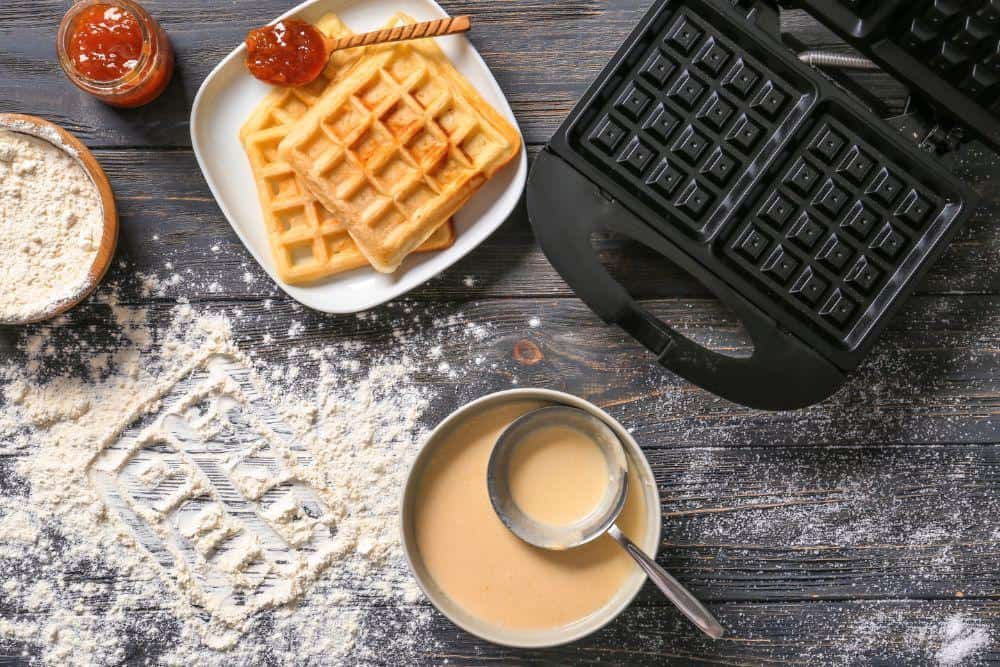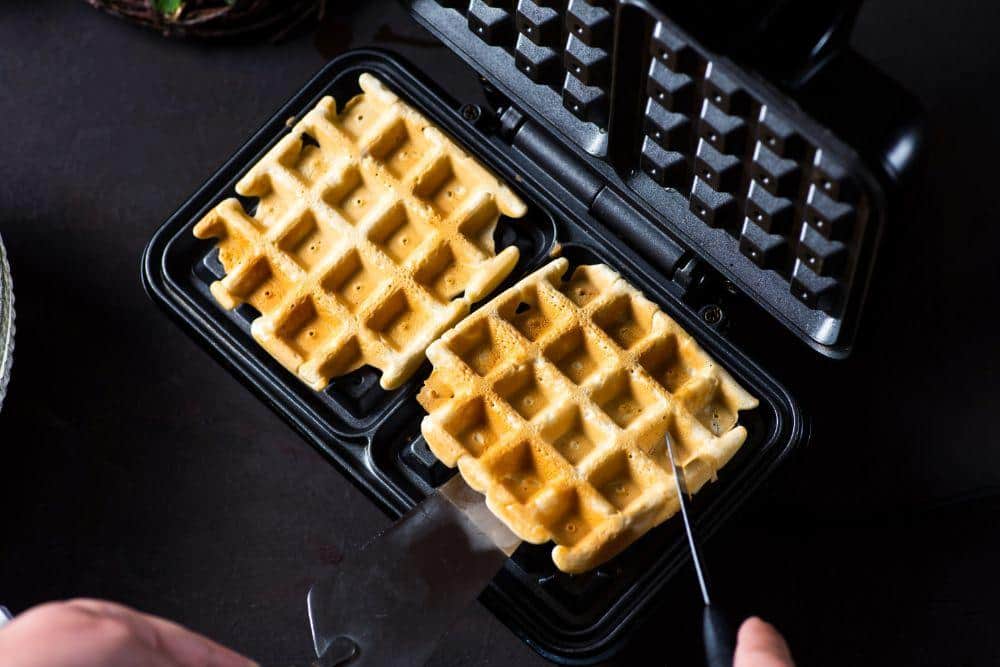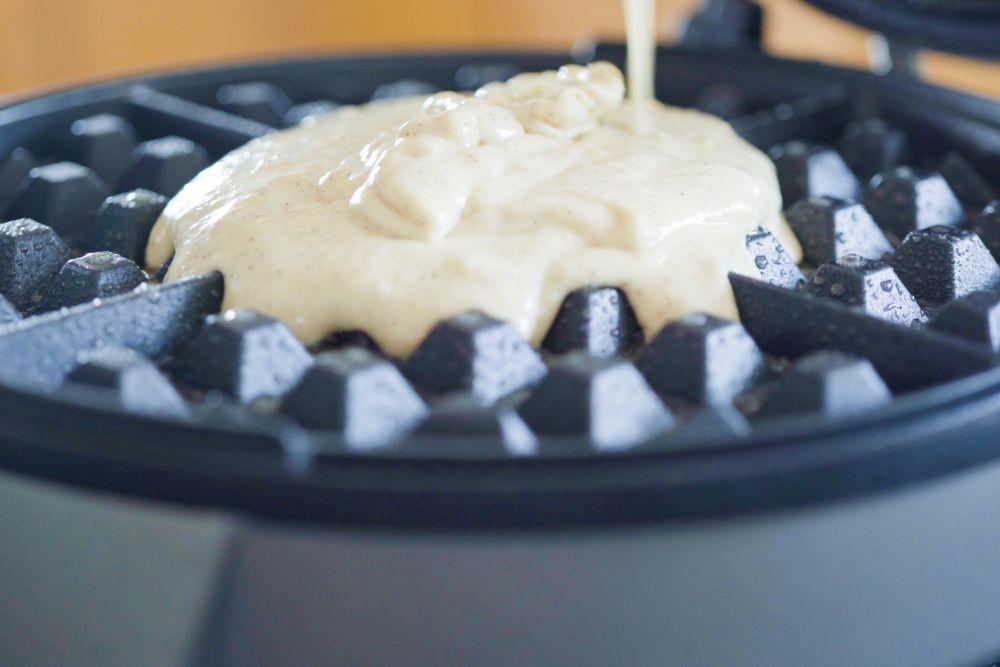You’ve made your waffle mix, your waffle iron is heating up, hash browns are sizzling, and you’re almost ready for a phenomenal breakfast. Then you wonder, what oil should I use with a waffle maker? There are many cooking oils, but which is the best for waffles?
The best oil to use with a waffle maker is vegetable oil, and the runner-up is canola oil, as these make the waffles crispy and prevent them from sticking without altering the flavor.
Keep reading to learn more about greasing a waffle maker and various oils and alternatives you can use to ensure your waffles slide off with ease.
You should always grease your waffle maker before using it, especially if you plan to make several waffles. Even “nonstick” waffle makers typically work best with lubricant between the waffle batter and the appliance.
For anyone who’s ever wondered to themself: what oil should I use with a waffle maker? Below are eight cooking oils rated for their use in a waffle maker. However, people have different preferences. So it’s okay if you don’t agree with these rankings.
In the end, you can use every one of these oils to grease your waffle iron so your waffle or pancake mix doesn’t stick to the iron, making a mess and ruining your beautiful breakfast.

Waffles That Are Cooked With Oil Are Less Likely to Stick to the Waffle Maker
Applying the oil to the waffle maker is the easy part. Drizzle a little oil onto a paper towel and wipe the top and bottom of the waffle maker until coated. You can do this after every few waffles to keep the surface slick and prevent sticking.
You can drizzle oil directly onto the waffle maker and swirl it around, but the paper towel method is the best as it ensures every inch is covered.
If you don’t want to use oil or don't have any in your kitchen, you can try one of these three alternatives.
The number alternative to oils is butter. You can use melted butter, cold butter, or softened butter to coat the waffle maker, making it slippery and tasty.
And butter makes for a wonderfully crispy waffle that is still moist and flavorful. For the most part, you can never go wrong with adding butter, as it makes everything better!
To apply butter, use a cold stick and rub it quickly over the hot waffle iron until coated. Or, you can coat a paper towel in melted or softened butter and rub the paper towel on the waffle maker until fully coated.
So this alternative is considered a waffle sin, but it’s convenient and practical. Cooking sprays, like Pam, are a quick way to grease your waffle maker so the waffles slide off easily.
Spray the top and the bottom for two seconds each, and you're ready to go! Professionals may frown on this hack, but if you think the waffles taste good and don’t stick, who cares?
If you have a lovely tub of lard sitting in your fridge or pantry, you can use this fat to grease your waffle maker.
Keep in mind that adding lard will increase your waffles' fat and calorie content, but so will using any oil or alternative, aside from the cooking spray, which is usually less than five calories.
To apply the lard, do the same thing as the butter. Rub some, whether color, soft, or melted, on a paper towel and rub it on the top and bottom of the waffle maker until coated.
Ghee is clarified butter popular in Indian cooking. Clarified means all the water has been removed from the butter, making it richer. Using it on a waffle maker is the same as using the butter; apply it with a paper towel.

Using Oil or Butter will Help Your Waffle Slide Off the Skillet When Finished
If you have a nonstick waffle maker, you don’t need to grease the waffle maker, right? Wrong.
You should always refer to the manufacturer's guide to be sure, but most nonstick waffle irons need a little grease or oil to prevent the waffles from sticking, despite the name.
If you’re unsure and don’t have the manufacturer's instructions, it’s usually best to grease the waffle maker lightly, especially if making more than one waffle. If you make several, the waffles are almost guaranteed to start sticking to the iron.
For a cast iron waffle maker, you 100% need to use some grease, or you’ll be scraping off some very sad-looking waffles from your iron.
If you’re wondering which type of waffle maker is best, the answer depends on a few factors.
This Ninja Waffle Maker is Nonstick
A nonstick waffle maker is a more convenient option. They heat up faster and are easier to use for a few reasons. First, they’re very light, so you don’t have to struggle to shift them around the counter or take them out of the cabinet.
Cast iron waffle makers can weigh a lot, making them less convenient. Cast irons also take longer to heat up, meaning you have to wait longer to have fluffy waffles in your mouth.
This aspect is super important to some people. If you love crispy waffles, you’re more likely to get a crunchy exterior on the waffle if you use cast iron.
Non-Stick irons don’t have the same ability to toast the waffle batter as a classic cast iron material can. If crispy waffles are the beginning and the end for you, definitely go with a cast iron waffle maker.
If you have a cast iron pan, you know they take a little more effort to maintain and use than Teflon pans. Cast iron can’t air dry or be wet, or it will start to rust. Don't run cast iron through the dishwasher or use standard dish soap.
Cleaning cast iron often takes some elbow grease, especially after making something messy like waffles. The clean-up involved with a cast iron waffle maker is a little more effortful, but many people find it worth it.
So this difference is less nuanced than people think. Some assume cast iron is the same as a waffle iron, but not necessarily.
A waffle maker runs on electricity and is essentially self-sufficient. So if your oven and stove are broken, you can still enjoy some fluffy waffles, thanks to your countertop waffle maker.
On the other hand, a waffle iron is not self-sufficient, meaning you need a separate heat source to make waffles with it. Waffle irons go on a stovetop and use the heat from the burner to cook the waffles rather than its own heating element.
Most people nowadays prefer the convenience of the waffle maker, while waffle irons offer a more traditional cooking experience. Both tools make yummy waffles, so it's a matter of preference.

You Can Achieve the Perfect Waffle With a Waffle Maker or a Waffle Iron
For more information on making waffles, read the frequently asked questions below.
Yes! The standard waffle recipe calls for vegetable oil, but you can substitute it with almost all the oils discussed above. Just consider how the oil will change the flavor of the waffles, as you may not like the taste.
For example, olive oil will make a more savory waffle, while coconut oil will make a sweeter, tropical-tasting waffle.
Belgian waffles are typically just thicker and fluffier than standard waffles. To make these, you need a specific Belgian waffle maker, or you’ll wind up with regular waffles. Many Belgian waffle recipes also include yeast in the batter, which makes them rise more.
